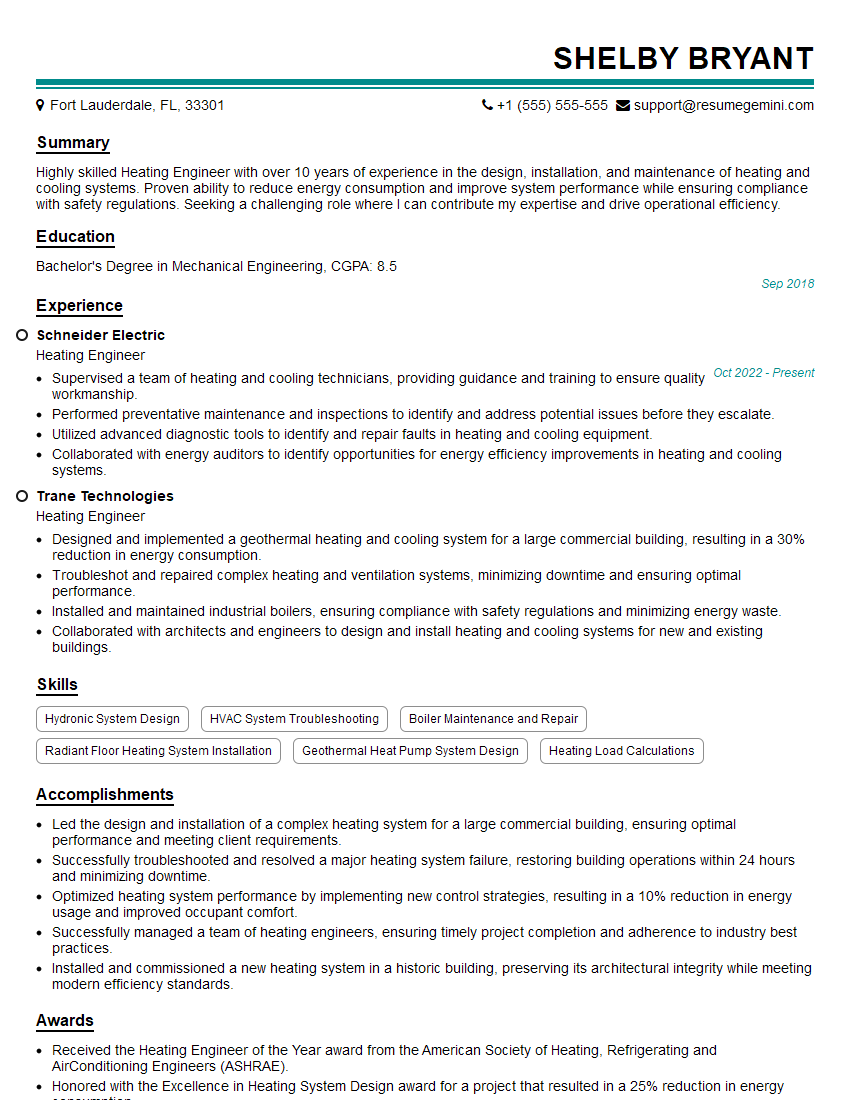Are you a seasoned Heating Engineer seeking a new career path? Discover our professionally built Heating Engineer Resume Template. This time-saving tool provides a solid foundation for your job search. Simply click “Edit Resume” to customize it with your unique experiences and achievements. Customize fonts and colors to match your personal style and increase your chances of landing your dream job. Explore more Resume Templates for additional options.

Shelby Bryant
Heating Engineer
Summary
Highly skilled Heating Engineer with over 10 years of experience in the design, installation, and maintenance of heating and cooling systems. Proven ability to reduce energy consumption and improve system performance while ensuring compliance with safety regulations. Seeking a challenging role where I can contribute my expertise and drive operational efficiency.
Education
Bachelor’s Degree in Mechanical Engineering
September 2018
Skills
- Hydronic System Design
- HVAC System Troubleshooting
- Boiler Maintenance and Repair
- Radiant Floor Heating System Installation
- Geothermal Heat Pump System Design
- Heating Load Calculations
Work Experience
Heating Engineer
- Supervised a team of heating and cooling technicians, providing guidance and training to ensure quality workmanship.
- Performed preventative maintenance and inspections to identify and address potential issues before they escalate.
- Utilized advanced diagnostic tools to identify and repair faults in heating and cooling equipment.
- Collaborated with energy auditors to identify opportunities for energy efficiency improvements in heating and cooling systems.
Heating Engineer
- Designed and implemented a geothermal heating and cooling system for a large commercial building, resulting in a 30% reduction in energy consumption.
- Troubleshot and repaired complex heating and ventilation systems, minimizing downtime and ensuring optimal performance.
- Installed and maintained industrial boilers, ensuring compliance with safety regulations and minimizing energy waste.
- Collaborated with architects and engineers to design and install heating and cooling systems for new and existing buildings.
Accomplishments
- Led the design and installation of a complex heating system for a large commercial building, ensuring optimal performance and meeting client requirements.
- Successfully troubleshooted and resolved a major heating system failure, restoring building operations within 24 hours and minimizing downtime.
- Optimized heating system performance by implementing new control strategies, resulting in a 10% reduction in energy usage and improved occupant comfort.
- Successfully managed a team of heating engineers, ensuring timely project completion and adherence to industry best practices.
- Installed and commissioned a new heating system in a historic building, preserving its architectural integrity while meeting modern efficiency standards.
Awards
- Received the Heating Engineer of the Year award from the American Society of Heating, Refrigerating and AirConditioning Engineers (ASHRAE).
- Honored with the Excellence in Heating System Design award for a project that resulted in a 25% reduction in energy consumption.
- Recognized with the Innovation in Heating Technology award for developing a new heating system that improved efficiency by 15%.
- Certified as a Master HVAC Technician by the National Institute for Certification in Engineering Technologies (NICET).
Certificates
- Certified Heating Contractor (CHC)
- North American Technician Excellence (NATE)
- Refrigeration Service Engineers Society (RSES)
- Building Performance Institute (BPI)
Career Expert Tips:
- Select the ideal resume template to showcase your professional experience effectively.
- Master the art of resume writing to highlight your unique qualifications and achievements.
- Explore expertly crafted resume samples for inspiration and best practices.
- Build your best resume for free this new year with ResumeGemini. Enjoy exclusive discounts on ATS optimized resume templates.
How To Write Resume For Heating Engineer
- Highlight your experience in designing and implementing energy-efficient heating and cooling systems.
- Showcase your troubleshooting and repair skills, emphasizing your ability to resolve complex technical issues quickly and effectively.
- Quantify your accomplishments whenever possible, providing specific examples of how you improved system performance or reduced energy consumption.
- Tailor your resume to each job application, highlighting the skills and experience that are most relevant to the position.
- Proofread your resume carefully before submitting it to ensure that it is free of errors and typos.
Essential Experience Highlights for a Strong Heating Engineer Resume
- Design and implement heating and cooling systems for commercial and industrial buildings, ensuring optimal performance and energy efficiency.
- Troubleshoot and repair complex HVAC systems, minimizing downtime and maximizing system uptime.
- Maintain and inspect heating and cooling equipment to identify and address potential issues before they escalate.
- Collaborate with architects and engineers to develop and implement design solutions for new and existing buildings.
- Supervise and train a team of heating and cooling technicians, providing guidance and support to ensure quality workmanship.
Frequently Asked Questions (FAQ’s) For Heating Engineer
What are the key skills and qualifications for a Heating Engineer?
Key skills and qualifications for a Heating Engineer include a strong understanding of heating and cooling systems, proficiency in system design and installation, troubleshooting and repair skills, and knowledge of energy efficiency principles.
What are the different types of heating and cooling systems that Heating Engineers work with?
Heating Engineers work with a variety of heating and cooling systems, including hydronic systems, HVAC systems, boilers, radiant floor heating systems, and geothermal heat pump systems.
What are the career prospects for Heating Engineers?
Heating Engineers are in high demand due to the increasing need for energy-efficient and environmentally friendly heating and cooling solutions. Career prospects are excellent for qualified professionals with experience in designing, installing, and maintaining heating and cooling systems.
What are the key industry trends that Heating Engineers should be aware of?
Key industry trends that Heating Engineers should be aware of include the increasing adoption of renewable energy sources, the growing demand for energy-efficient systems, and the development of smart and connected heating and cooling technologies.
What are the professional development opportunities for Heating Engineers?
Heating Engineers can pursue professional development opportunities through industry certifications, continuing education courses, and membership in professional organizations such as the American Society of Heating, Refrigerating and Air-Conditioning Engineers (ASHRAE).